Electric vehicles are quickly becoming a more common sight on roads across the globe. In the United States, partly a result of significant increases in incentives for electric car buyers, annual electric vehicle (EV) sales increased an astounding 433% from 2020 to 2023. Electric vehicles now make up nearly 10% of all new vehicle registrations globally. A few years ago, major car rental companies joined in on the electric car craze adding EVs to their rental fleets.
Hertz was a major proponent of electric vehicles and had plans to continue to add them to its fleet as recently as 2021. In 2021, Hertz announced plans to add an additional 100,00 Tesla EVs by the end of 2022. The rental car agency also inked deals with Polestar, an electric car manufacturer owned by Volvo. Hertz has since turned away from electric vehicles noting the high costs to service these vehicles.
Despite the bumpy road for electric vehicles and rental car companies, EV rentals are still a common sight in many major cities.
Renting an electric car can be an exciting and eco-friendly way to travel, However, if you’ve never rented an electric car before, you might have a few questions and probably some concerns as well. In this guide, we’ll walk through everything you need to know about renting an electric car.
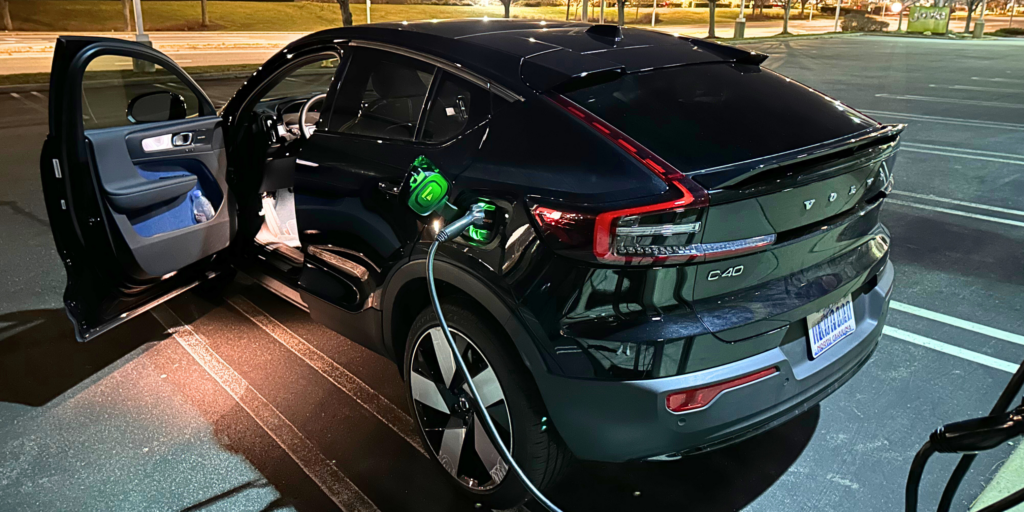
Which Car Rental Companies Offer Electric Cars?
Despite recent developments, including Hertz’s decision to offload 20,000 Teslas, most major car rental agencies continue to offer EVs. Many companies, like Sixt, continue to add EVs to their fleet at a pretty significant rate. No matter your preferred rental car company, you will likely have the option to rent an electric car during your next trip.
Here is a current list of the rental car companies that offer EV rentals and the types of EVs they offer:
| Company | Vehicle Classes | Typical Makes and Models |
|---|---|---|
| Alamo | Midsize, Intermediate, Luxury | Nissan Leaf, Polestar 2, Tesla Model S |
| Avis | Midsize, Intermediate, Luxury | Chevrolet Bolt, Tesla Model 3, Ford Mach-E, Genesis G80E |
| Budget | Budget, Intermediate, Luxury | Chevrolet Bolt, Tesla Model 3, Ford Mach-E |
| Enterprise | Midsize, Luxury | Nissan Leaf, Tesla Model S |
| Europecar | Budget, Midsize, Intermediate, Luxury, Luxury SUV | Numerous EVs in Fleet |
| Hertz | Budget, Intermediate, Crossover | Chevrolet Bolt, Polestar 2, Volvo C40, Tesla Model 3 |
| National | Intermediate, Luxury | Nissan Leaf, Polestar 2, Tesla Model S |
| Sixt | Budget, Midsize, Intermediate, Luxury, Luxury SUV | Numerous EVs in Fleet |
| Thrifty | Midsize, Intermediate | Kia Niro EV, Polestar 2, Tesla Model 3 |
How Much Does It Cost to Rent an Electric Car?
When electric car rentals were first introduced, they were usually available as upgrades. As a result, you could expect to pay a premium to rent an electric car. Over the past few years, EV rentals have come down in price and, in many cases, are priced no different than standard gas-powered vehicles.
Ultimately, you can expect to pay roughly the same when renting an electric car instead of a gas-powered car. The price to rent an electric car will depend on the location from which you rent, your dates, and the car class you pick.
Here are some examples of prices for electric car rentals in the coming months:
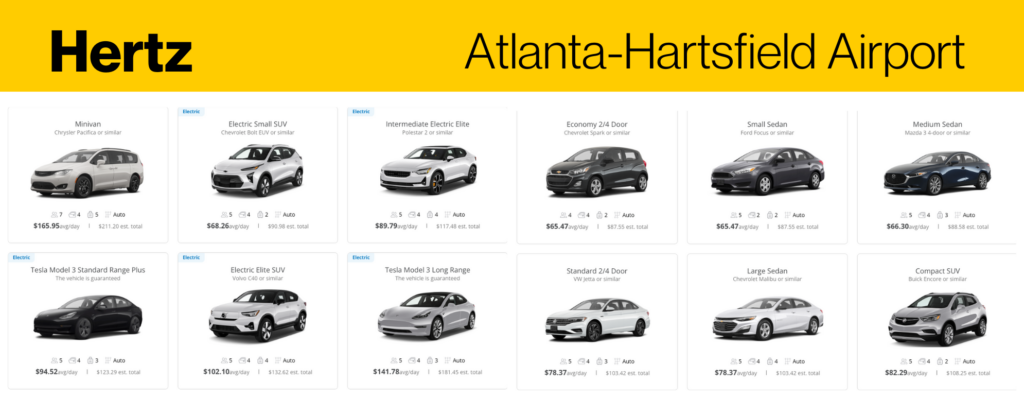
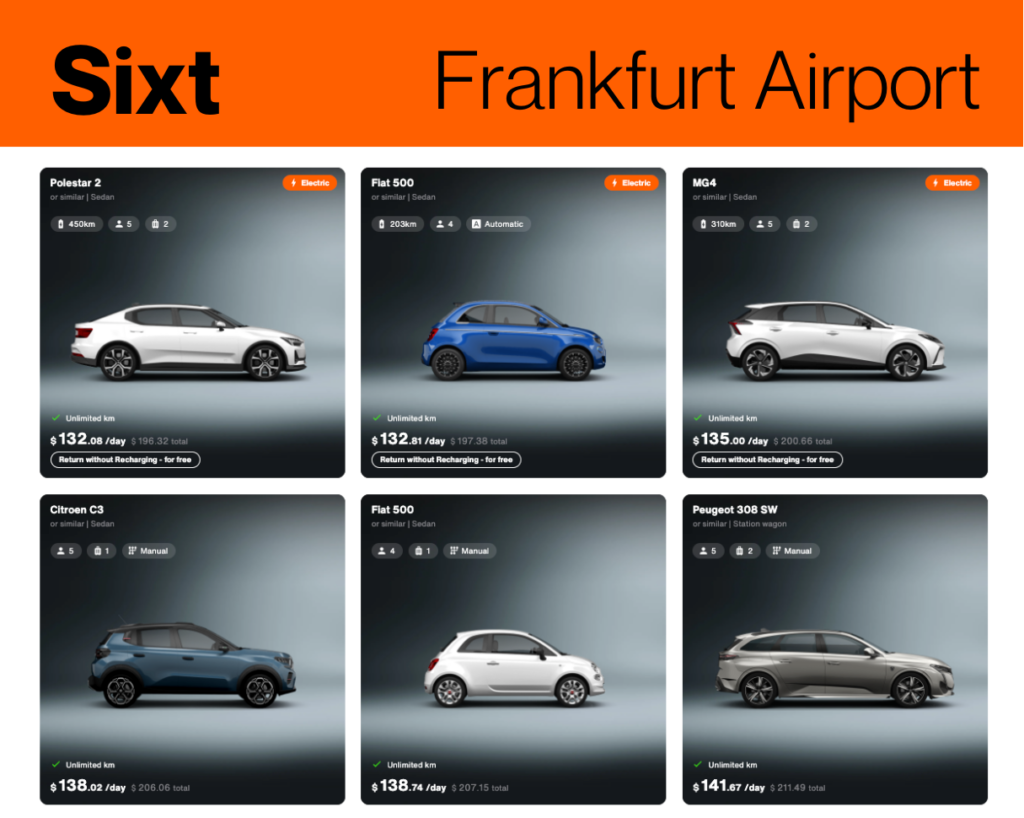
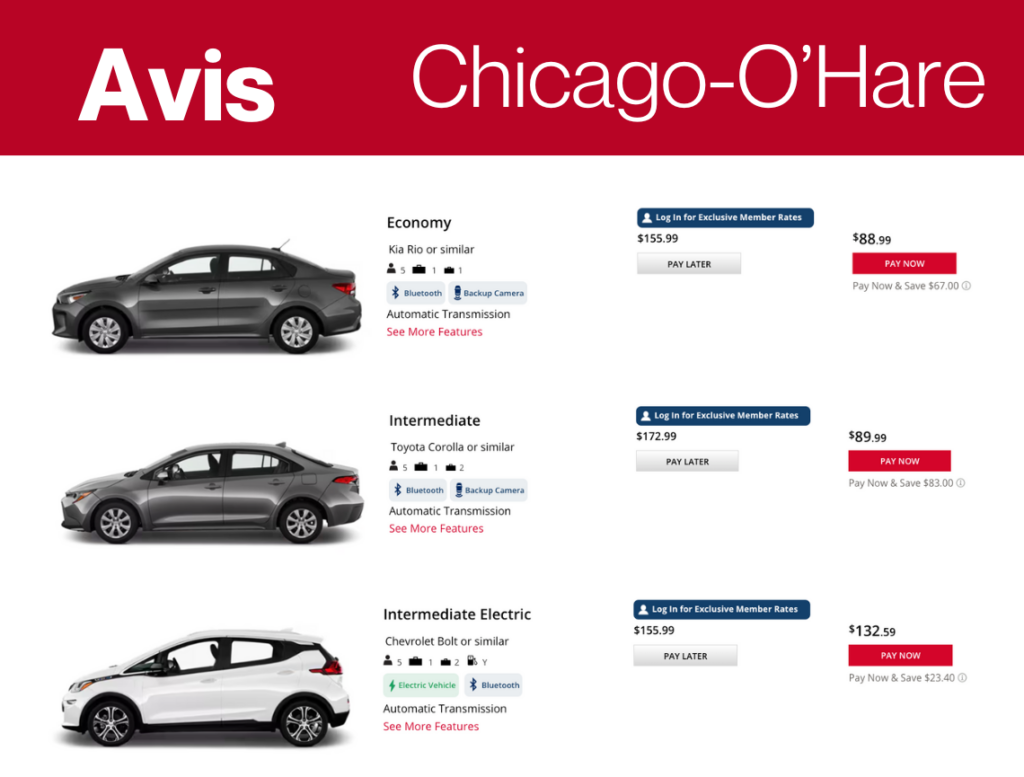
As a rule of thumb, car rental pricing is always dependent on the individual market. The location from which you rent is the main factor in pricing, as well as the type of car you plan on renting. Most car rental agencies will charge you the same to rent an electric car compared to renting a gas-powered car. This might not always be the case as availability is also a factor in pricing.
What is it Like to Rent an Electric Car?
So, let’s assume the price to rent an EV is about the same as the price to rent a car with a gas-powered engine. You probably still have some questions about renting an electric vehicle. I stayed clear of renting EVs for quite some time, primarily as a result of range anxiety.
Range anxiety is the rational concern a driver has about the range of their electric car. Gas stations are much easier to find and filling up a gas tank only takes a few minutes. With electric cars, finding a charging station might not be a simple task, and charging a car can, in some cases, take hours.
I rent cars quite a bit as I travel for work frequently. My preferred rental agency is Hertz as I hold President’s Circle status thanks to The Platinum Card from American Express. Hertz President’s Circle allows me to select almost any class of car when booking and then pick from a dedicated lot. The President’s Circle lot features vehicles ranging from Hyundai Sonatas to Mercedes GLC Crossovers. Lately, I have come across quite a few electric cars on the lot.
It wasn’t until earlier this year that I decided to rent my first electric car from Hertz. To my surprise, it was much easier and far less stressful than I had originally anticipated. In the end, renting an EV over a car with a combustion engine actually saved me a few bucks.
Here’s what it’s like to rent an electric vehicle.
Picking Up an EV from The Lot
Picking up an electric car from the lot is a process identical to that of picking up a gas-powered car. Most times, EVs are parked alongside gas cars and can even be hard to spot. If you don’t have an assigned car and still want to avoid accidentally picking up an EV, there are a few dead giveaways in identifying an EV.
The first thing to look for is an exhaust tailpipe. Since there is no combustion, EVs do not emit any exhaust. This is what makes them more environmentally friendly. If you don’t see a tailpipe, the car is battery-powered.
You can also tell an electric car by taking a quick look at the dashboard or gauge cluster. Instead of a gas tank gauge, you will see two other measurements. EVs will display both the battery level and the remaining range.
Once you’ve picked up your electric car, it’s time to hit the road.
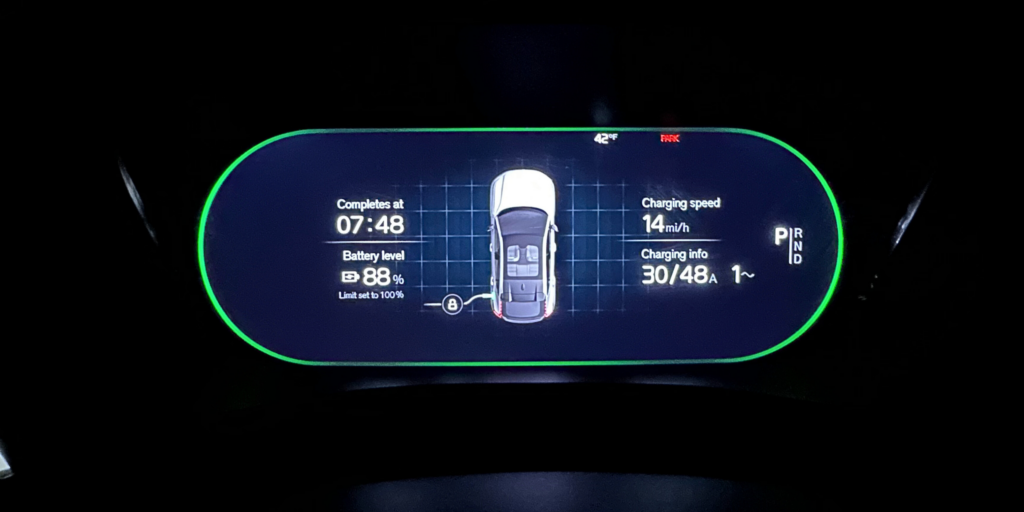
What Is It Like Driving an Electric Vehicle
The driving experience is also pretty similar to that offered by a car with a gas engine. You will likely notice one main difference early on in your rental. Electric cars are extremely quiet. Without a combustion engine, the only noises audible in an electric car are road noise and the hum of the battery when accelerating.
Another thing that takes some getting used to is the lack of an ignition switch. Electric cars do not have a push-to-start button. The ignition found in internal combustion cars allows the driver to send a signal to the engine to start the combustion process. Similar to any other battery-powered device, a spark isn’t needed to get the battery going. So, electric cars lack a clear on-off switch. You get in the car and shift into drive to activate the vehicle.
This leads us to our first frequently voiced concern.
How do I avoid accidentally discharging my rental’s battery?
It turns out that it is actually challenging to unintentionally discharge an EV’s battery. Unless you are in the vehicle, the battery does not drain much if any. The only way you can accidentally drain the battery is by using remote functions, which are often not available on rented EVs, to run the air conditioning or infotainment system.
So, accidentally draining an EV’s battery is not something you should worry about.
Is the driving experience any different from a gas-powered car?
The answer to this question is, somewhat. The biggest difference behind the wheel of an EV compared to behind the wheel of a gas-powered car is the result of an EV’s regenerative braking. When you slow down or apply the brake in an electric car, the battery begins to recharge.
In some EVs, just taking your foot off the accelerator will lead to activation of the brake. This is known as single-pedal driving which takes some getting used to.
Luckily, in the EVs I have rented, you can turn off the single-pedal driving feature. In other EVs, you can even adjust the regenerative braking settings to make the drive more comfortable.
You will also notice a significant change in acceleration with an EV compared to a gas-powered car. Since a battery can provide almost instantaneous power, EVs can accelerate much quicker than cars with an internal combustion engine. Punching the gas on non-performance gas-powered cars might not do much except drain your gas tank.
In an EV, punching the accelerator will lead to the vehicle taking off at a high rate of speed. Most drivers will recognize this pretty early on in their drive so, unless you have a need for speed, this is not all that much of a concern.
Charging an Electric Car
This is the big question and concern we probably all have about renting an electric car. Despite a significant increase in the availability of EV chargers across the US, Canada, and Europe, charging an EV is still not as simple as filling up a gas tank.
Many EV owners will tell you that they are never concerned about the range of their cars. This is likely because they can charge their cars overnight while at home. When you rent an EV, you don’t have this luxury. Many major hotel chains have installed or are actively installing EV chargers. But, there is no guarantee that your hotel will have a charger and that it will be unoccupied during your stay. If you’re staying at a vacation rental, Airbnb, or with friends or family, your chances of having a charger available overnight are even lower.
To my surprise, I rarely, if ever, have range anxiety when renting an electric car. In all major US cities, you will have access to a charger. You might have to drive a few minutes to get to it but, locating a charger is probably not going to be a big concern when renting an EV.
In the United States, there is an expansive network of chargers including a growing number of fast-charging stations. Up until recently, fast charging stations were hard to find. Now, in major cities, you can usually find a few nearby. If you’re unfamiliar with fast and standard chargers, the difference is pretty straightforward.
Fast chargers allow EVs to receive DC (direct current) power as opposed to AC (alternating current) power. DC power allows for much faster charging. However, you will find that almost every fast charger comes at a higher cost than standard chargers. Standard chargers utilize AC power and, depending on the charging, can take much longer than a fast charger to charge an EV.
Here’s a brief overview of major charging networks in the United States:
| Company/Network | Charger Types | Fees |
|---|---|---|
| Blink Charging | Standard AC | Varies, Usually Free |
| ChargePoint | Standard AC | Typically Free |
| Electrify America | DC Fast Chargers, Some Standard AC | $0.56 / kwh (may vary), (Session fees may apply) |
| EV Connect | Standard AC, Some DC Fast Chargers | Varies, Standard: $0.10-$0.20 / kwh Fast: $0.20-$0.40 / kwh |
| EVgo | DC Fast Chargers | Varies, $0.30-$0.70 / kwh (+ Session Fee) |
| Volta Charging | Standard AC | Typically Free |
| Tesla | Tesla Fast Charge (Teslas Only) | Varies |
With some chargers available at no cost, you may be able to go a full rental without having to pay to charge your vehicle. Companies like ChargePoint and Volta rarely require payment to charge your EV. However, both of these companies operate standard AC chargers which will take much longer than DC fast chargers. I have managed only one fee-free EV rental over the course of 5 EV rentals.
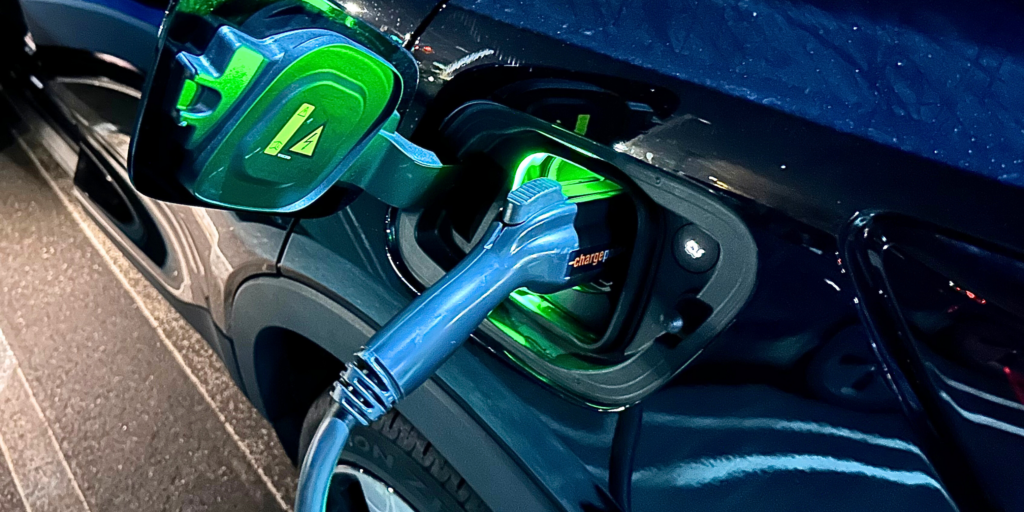
So, just how much can I expect to pay to charge my EV rental?
The cost to charge an EV depends on the vehicle and the charging station. Some charging stations, as noted above, are free of charge. Others charge as little as $0.30 per kilowatt hour while during peak times, rates can exceed $0.70 per kilowatt hour. I have yet to spend over $25 during a rental to recharge my vehicle.
If you get your battery down close to 0% and need a full charge, the total cost will depend on the cost per kilowatt hour. This is not unlike filling up a gas tank with the total cost dependent on the price per gallon at a specific station. But, since most of us are wired for price per gallon (or liter) and not price per kilowatt hour, estimating the cost to recharge an EV rental can be confusing.
You can find some simple online calculators to determine how much a charge will cost you. Additionally, you will find some sample rates below:
- Kia Niro EV, 64 kWh capacity at $0.45 per kWh: $28.80 for full charge
- Tesla Model 3, 62 kWh capacity at $0.45 per kWh: $27.90 for full charge
- Volvo C40 EV, 78 kWh capacity at $0.45 per kWh: $35.10 for full charge
Returning an Electric Car Rental
The final question that often comes up has to do with how car rental companies handle the battery level upon returning an EV rental.
Do I need to return my electric car rental fully charged at 100%?
The answer might be yes depending on the rental car company and the battery level at pick-up. Some car rental companies, like Sixt, allow you to return your car at any charge level. Others, like Hertz, will charge a flat fee if you do not return it at or above the charge level it was at when you picked it up. Here are the different policies of major rental car companies:
| Company | Policy | Fees |
|---|---|---|
| Alamo | No stated policy | No fee |
| Avis | At or above 10% | If returned at less than 10%, a $35 fee applies |
| Budget | At or above 70% | If returned at less than 70%, a $35 fee applies. A low battery fee of $35 also applies if vehicle returned under 10% |
| Enterprise | No stated policy | No fee |
| Europcar | Full charge included | No fee |
| Hertz | Return at or above level at pick-up | If returned below level at pick-up, $35 fee applies or $25 fee for President's Circle members |
| National | No stated policy | No fee |
| Sixt | Full charge included | No fee |
| Thrifty | At or above 70% | If returned at less than 70%, a $35 fee applies. A low battery fee of $35 also applies if vehicle returned under 10% |
You will also find that some rental car companies are more flexible than others. I have returned EVs to Hertz below the level at which I received them at pick-up and have not been charged. Other times, I have been charged the flat fee noted in the table above. On various online forums, renters have had similar experiences. Ultimately, most car rental companies do not charge if you drop off an uncharged vehicle or the fee is relatively insignificant.
In the case of Hertz’s policy, it’s almost always impossible to return the car at or above the level at pick-up as most of the EVs I have rented from Hertz were charged at or above 95% at pick-up.
Should You Rent an Electric Car?
Whether or not I recommend renting an electric car depends on your travel plans. For city driving or commuting, yes, I would recommend renting an electric car. With daily rental rates for EVs usually being similar to rates for gas-powered cars, you might be able to save a few bucks by forgoing a tank of gas.
Additionally, electric cars offered by most car rental companies are quite nice. Hertz usually has Polestar 2s or Volvo C40s on the lot, both of which feel quite premium and offer a comfortable driving experience.
If you are planning on taking your rental out on a road trip covering more than 300 miles, I would caution against renting an electric vehicle. Yes, there has been a significant increase in the number of EV stations being installed along major interstates but, I would not personally feel comfortable making a long drive in a rented EV.
Ultimately, it comes down to how comfortable you are with EVs and the idea of having to find a charging station. For me, it’s a no-brainer but for others, I still understand the comfort offered by a good old internal combustion engine (ICE).
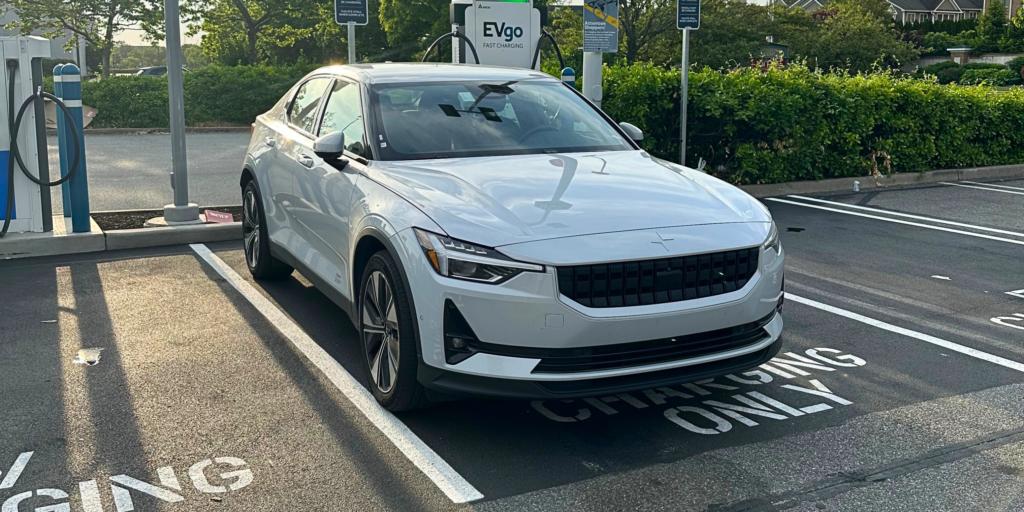
The Bottom Line
Electric vehicles are rapidly becoming a common sight on roads worldwide, with their popularity reflected in the astounding 433% increase in annual EV sales in the United States from 2020 to 2023. Whether or not you are pro or anti-EV, they are here to stay. Rental car companies recognize this and despite some setbacks will continue to add EVs to their fleets.
Renting an electric car can be an exciting and comfortable way to travel, offering a smooth, quiet ride and the potential to save money on fuel costs.
While there are some unique considerations, such as range anxiety and the need to find charging stations, these can be easily managed with a bit of planning.
For city driving or shorter commutes, renting an electric car is highly recommended. You’ll enjoy a premium driving experience with modern features. However, for longer road trips, especially those covering over 300 miles, you might prefer the convenience and familiarity of a gas-powered vehicle.
Have you ever rented an electric car? Would you consider an EV for your next rental?
Featured Offers on Car Rentals
- Avis – Limited Time: Get a free upgrade plus up to 35% off Pay Now rates
- Budget Car Rental – Limited Time: Get a free upgrade plus up to 35% off Pay Now rates
- Dollar Rent-A-Car: Book the Manager’s Special and get a compact car or larger for the compact rate
- Europcar: Flash Sale: Get up to 25% Off – Ends May 31st




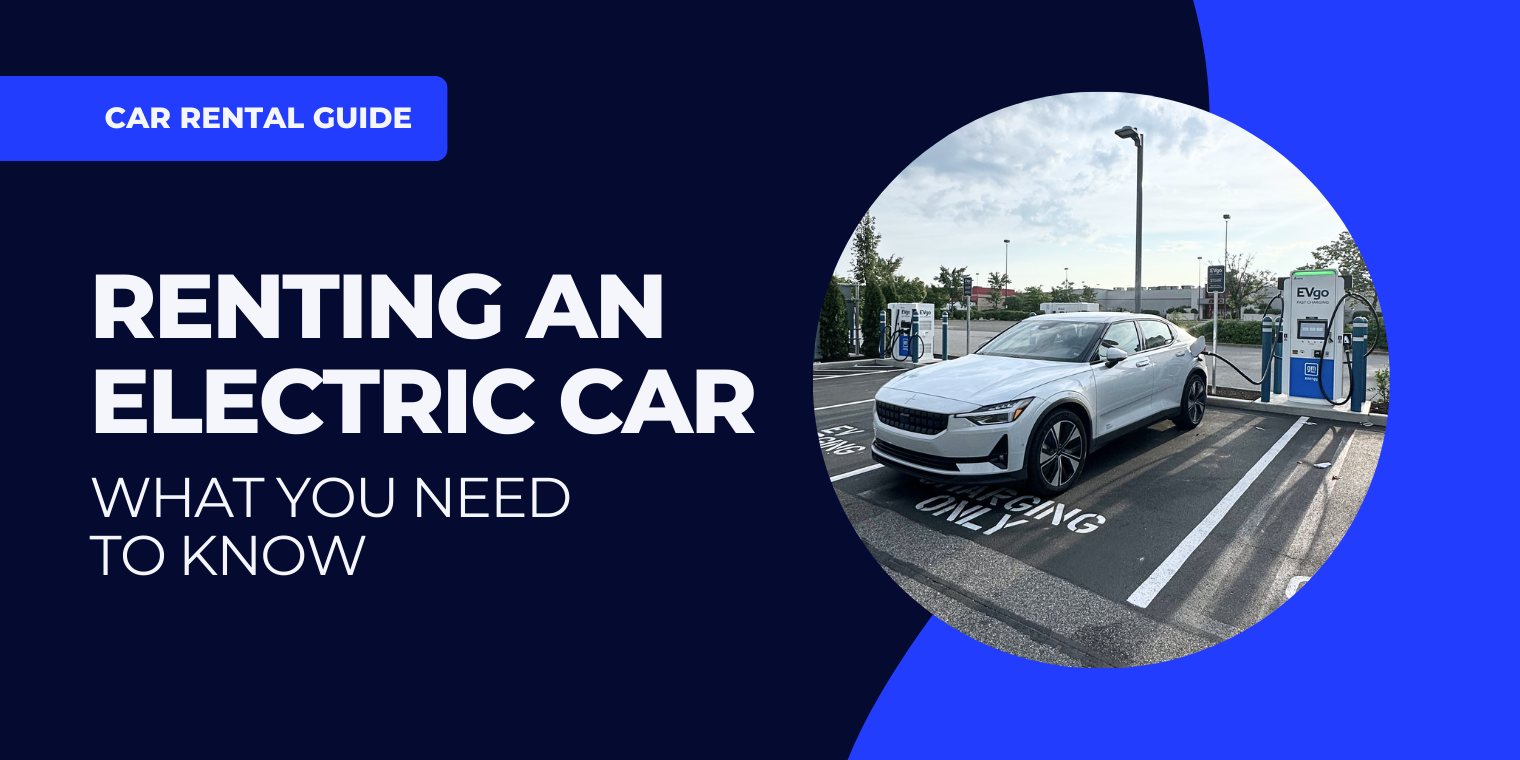








I will NOT rent an electric car. I live in the US an visited relatives in the UK for two days in March. I was given an electric car and decided to try it. Never again. The app to find charging stations only showed locations in Germany. I spent hours finding chargers, and if I found one I needed to sign up for apps on my phone, which was challenging. At the end, I started a 95 mile trip with a range of 165 miles, but ended up with 15 miles — 55 miles ‘disappeared.’
That’s odd that you lost that much range during your rental but I have heard of that happening. I personally wouldn’t rent an electric car in Europe except maybe for in major cities in Germany. However, I have found it quite easy to find chargers in the United States so I don’t think you would have the same issues in the states.
Yes, Hertz planned to buy LOTS of EV’s until no one wanted to rent them. So the president lost his job for buying into the idea. Hertz has lots of them for sale now. Return on EV with a full charge while trying to catch your flight?? Good luck with that.
From what I heard, it wasn’t that people weren’t renting them. It was that, like any rental car, they were racking up a ton of miles and required repairs at a much faster rate than privately owned EVs for personal use. So, the maintenance costs appear to be the big problem. Hertz still has a pretty big fleet of EVs but it looks like they’re moving towards Polestars over Teslas.